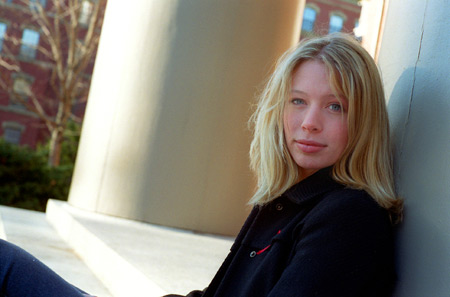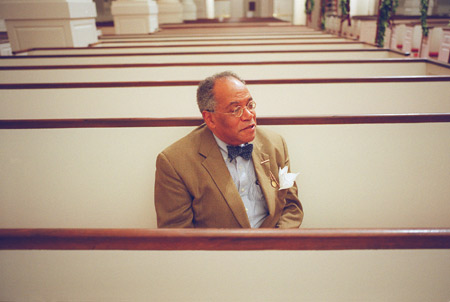See light at end of semester darkened by tragedy
See light at end of semester darkened by tragedy

As the academic year began this fall, the annual rites of passage from high school to college, from vacation back to school, were rendered indelible by the events of Sept. 11. Many of us will see no before-and-after division more clearly in our lives.
And now, at another transition time, as fall slips into winter, classes cede to a new vacation, and noisemakers and party hats bring in a fresh year, we pause to reflect on a semester darkened by the long shadow of Sept. 11.
The wounds inflicted by the events of Sept. 11 – the heart-pounding uncertainty and raw-nerved grieving – persist, three months later, as a dull, chronic ache. “It’s like there’s this constant sadness all the time,” says Jordan Berkow ’03. “It really has impacted my life every day.”
The New Yorker’s view
Berkow, a native New Yorker, returned to Manhattan within days of Sept. 11 to find a city changed – but not just for the worse. “Everyone seemed tuned in to everyone else’s feelings,” she says. “Walking around New York, I was feeling a connection with everyone I saw.”
Berkow witnessed a particularly powerful moment in downtown Manhattan’s Washington Square Park, where crayons and large sheets of paper had been put out for people to record their feelings. “This huge fireman, covered with soot, walked in and started drawing,” she recalls. “He wrote ‘tell my brothers we will never forget you.’”
Kamala Salmon ’03 spent Sept. 11 fearing for her mother, who worked next to the World Trade Center and was in the center just before the plane hit. It was hours before Salmon heard from her mother. “It was the hardest day ever,” she says.
Making time for God
Salmon has deepened her faith since the attacks. “I make more time for God on a daily basis because he makes time for me,” she says. Raised Christian, Salmon had attended services at the Pentecostal Tabernacle in Central Square since coming to Harvard, but regular churchgoing had slipped as she managed a busy school schedule. Since Sept. 11, she says, “I definitely try to make time, even when it doesn’t seem like there’s time.”
She is by no means alone, according to the Rev. Professor Peter J. Gomes, Plummer Professor of Christian Morals and Pusey Minister in the Memorial Church. From Sept. 11 through mid-October, he says, Memorial Church saw “Easter-sized congregations” every Sunday. “They were really over the top in terms of numbers, but also in terms of intensity,” he says.
Although Sunday congregations have leveled off somewhat, Gomes estimates that they remain about 15 percent larger than usual for this time of year. In addition, he says, attendance at Morning Prayers in Appleton Chapel has stayed high throughout the semester. “People have incorporated daily service into their routines,” he says.
Watching two powerful symbols of the secular world – the World Trade Center and the Pentagon – crumble has led many to seek solace in religion, says Gomes. “You begin to wonder what does last, what is permanent. When there is something that challenges, as this did, people then are forced to ask basic questions.”

Gomes, who planned fall semester services in August, has not altered them to address the events of Sept. 11. “Whatever it was that I was going to say, we hear it differently now,” he explains. Similarly, he says, Memorial Church has not changed its role at Harvard; what has changed is that more people are discovering it.
The Harvard Islamic Society (HIS) has seen a similar increase in attendance at its weekly prayer services. “A lot of people realize that it is important to strengthen what is really important to the faith: a connection to God,” says Saif Shah Mohammed ’02, president of HIS.
The Harvard Islamic Society marks the holy month of Ramadan this month with a strong focus on reaching out, breaking the fast as a group every evening with open prayers and dinner. “The Muslim community at Harvard has come together really well in the last few months,” says Mohammed.
Mohammed also turned to religion to deal with the events of Sept. 11, which for him had an aftermath of hate mail and an even more overwhelming show of support. “I have to put faith in something, and God seemed a natural,” he said. He’s reading more of the Qu’ran, he says, and being more attentive in prayer.
Not all of Mohammed’s work is inward-focused. “My first reaction was that this was something that has to be spoken against,” he said, contradicting his friends and family in his native Bangladesh and his home of Kuwait, who advised him to keep a low profile.
“It is important to set the record straight about what people believe,” he said. “There is nothing within Islam that allows these atrocities to be committed.”
‘I needed to do something’
While many have responded to the Sept. 11 attacks with prayer, others are taking to the soapbox. “I’ve certainly become more radical since Sept. 11,” said Shelby Meyerhoff ’03, who has been active in the Harvard Institute for Peace and Justice, a student group formed after Sept. 11 to support peace and nonviolent conflict resolution. “It’s really globalized my view on the world,” she says.
As he passed out flyers at one of HIPJ’s weekly “speak out” forums in front of the Science Center, graduate student Bharath Vallabha admitted that activism was new to him. “I was very disinterested in politics and international relations in general,” he said, adding that he is now trying to educate himself on the issues surrounding the attacks and the war on Afghanistan. Sept. 11 “made me realize there’s something we can do.”
Meyerhoff agrees. “It’s made me think a lot about what one person can accomplish,” she said.
The events of Sept. 11 have moved Liora Halperin ’05 and Rachel Stein ’04 to literary, not political action. The pair is in final production of “Sources of Inspiration,” a collection of students’ writing in response to the attacks.
“I felt like I needed to do something,” said Stein. “Giving people a way to make their voices heard was a symbol of unity.”
“There was a lot of great stuff being said or written informally,” added Halperin. She and Stein thought “it would be really impressive to compile these responses in a tangible format.”
“Sources of Inspiration” was born at a Harvard-Radcliffe Hillel brunch that brought together Jewish, Muslim, and Catholic students. Halperin and Stein have received funding from the Harvard Foundation and support from Hillel, where they are muddling through the page-design program QuarkXPress to lay out the book of about 15 pieces.
“I’ve really enjoyed reading the responses,” said Halperin. “It’s very interesting how students react to the same thing in very different ways.”
Stein and Halperin anticipate distributing “Sources of Inspiration” to all undergraduates and, if their printing budget holds out, they’ll try to get it into the hands of graduate students, faculty, and administrators. They are targeting reading period in January for completion. “Hopefully it will be a good chance to reflect back on this semester that’s been so colored by these events,” said Halperin.
Harvard’s role
For President Lawrence H. Summers, who arrived at Harvard in July, Sept. 11 launched his first academic term with unexpected and eerie demands on his leadership. “I think there are profoundly important values issues that all of this raises for the University,” he said. “Some go to the importance of public service, some go to our need to recognize that the freedom that makes an institution like Harvard possible is not something that we can take for granted.”
Indeed, as the Harvard community reflects on Sept. 11, uplifting messages emerge from the grief and the horror. “There’s a sense of unity that the campus hadn’t had until that point,” said Johanna Paretzky ’03, who’s found familial support in the Kuumba Singers, of which she’s vice president.
Jordan Berkow echoed Paretzky. “It showed the worst in people, but it also showed the best in people,” she said.
“It reminds me, and I think all of us, of what’s most important to us: our families, the contributions that we make to society,” said Summers. “I’m convinced that it makes the work of the University far more important than it was before … because it’s by continuing to do the positive things we combat the nihilism that lies behind the attacks of Sept. 11.”




